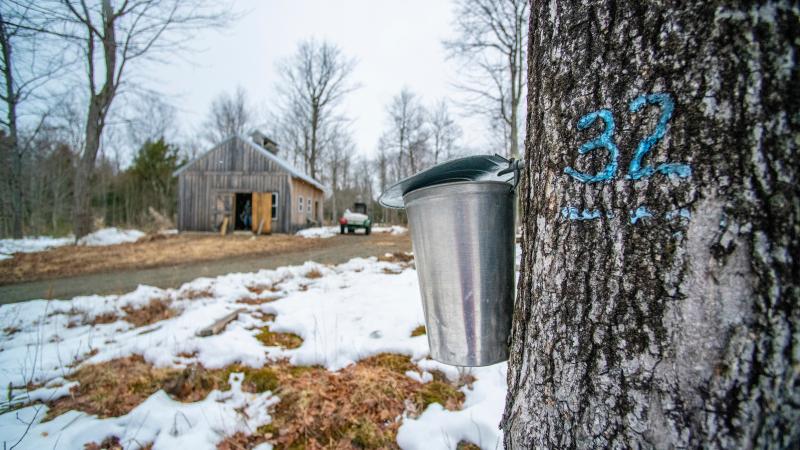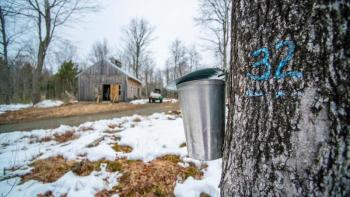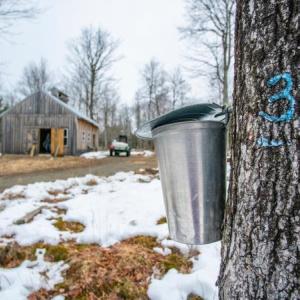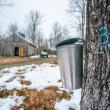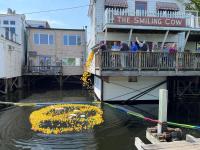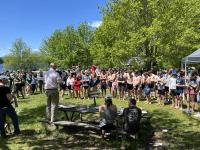UMaine Extension 4-H offers February maple sugaring workshops in Waldo County
Not long after the New Year celebrations have ended and Maine hunkers down for several more weeks of winter, some farmers and landowners across the state turn their attention to maple sugar season. Depending on the weather, maple trees start to release their sweetness anytime between February and April, and there’s a lot of work to be done to prepare for collecting the sap and boiling it down into syrup.
Maple Sugaring 101 is a three-week program open to current 4-H'ers ages 12 and up who are interested in learning about the maple sugaring process and live in Somerset, Piscataquis, Penobscot and Waldo counties. Participants will learn about forest management, tapping trees, transporting sap, using an evaporator, grading and storing syrup, and operating a maple sugaring business.
Each week, participants will learn about the process and connect with other young maple sugar makers through online meetings and in-person workshops led by Extension and University of Maine experts. Online meetings are scheduled for 6 p.m. on Wednesdays: Feb. 22, March 1 and March 8. On-site workshops where participants can gain hands-on experience will be held Saturdays with the following schedule:
-Feb. 25 at local sugar houses in each county
-March 4 at the University of Maine’s Thomas J. Corcoran Sugar House in Old Town
-March 11 at the local county Extension office or other location suitable for creating value-added products (TBD)
“Maple sugaring is very weather-dependent,” said UMaine, in a news release. “However, these dates are likely to be suitable for maple sugaring activities in many parts of the state.”
Registration is required; there is no cost. For more information, to register or to request a reasonable accommodation, contact your county office:
Penobscot or Piscataquis County: Sheila Norman, sheila.norman@maine.edu; 207.942.7396 or 207.564.3301.
Somerset County: Karen Giles, karen.giles@maine.edu; 207.474.9622.
Waldo County: Sadee Mehuren, sadee.mehuren@maine.edu; 207.342.5971.
General questions about the program can be directed to Andrew Hudacs, andrew.hudacs@maine.edu; 207.581.8204.
University of Maine Cooperative Extension
As a trusted resource for over 100 years, University of Maine Cooperative Extension has supported UMaine's land and sea grant public education role by conducting community-driven, research-based programs in every Maine county. UMaine Extension helps support, sustain and grow the food-based economy. It is the only entity in our state that touches every aspect of the Maine Food System, where policy, research, production, processing, commerce, nutrition, and food security and safety are integral and interrelated. UMaine Extension also conducts the most successful out-of-school youth educational program in Maine through 4-H.
About the University of Maine:
The University of Maine, founded in Orono in 1865, is the state's land grant, sea grant and space grant university, with a regional campus at the University of Maine at Machias. UMaine is located on Marsh Island in the homeland of the Penobscot Nation. UMaine Machias is located in the homeland of the Passamaquoddy Nation. As Maine's flagship public university, UMaine has a statewide mission of teaching, research and economic development, and community service. UMaine is the state's public research university and a Carnegie R1 top-tier research institution. It attracts students from all 50 states and 86 countries. UMaine currently enrolls 11,571 undergraduate and graduate students, and UMaine Machias enrolls 763 undergraduates. Our students have opportunities to participate in groundbreaking research with world-class scholars. UMaine offers 77 bachelor's degrees and six undergraduate certificates, as well as more than 100 degree programs through which students can earn doctoral or master's degrees, professional master's degrees, and graduate certificates. UMaine Machias offers 18 associate and bachelor's degrees, and 14 undergraduate certificates. The university promotes environmental stewardship, with substantial efforts campuswide to conserve energy, recycle and adhere to green building standards in new construction. For more information about UMaine and UMaine Machias, visit umaine.edu and machias.edu.

